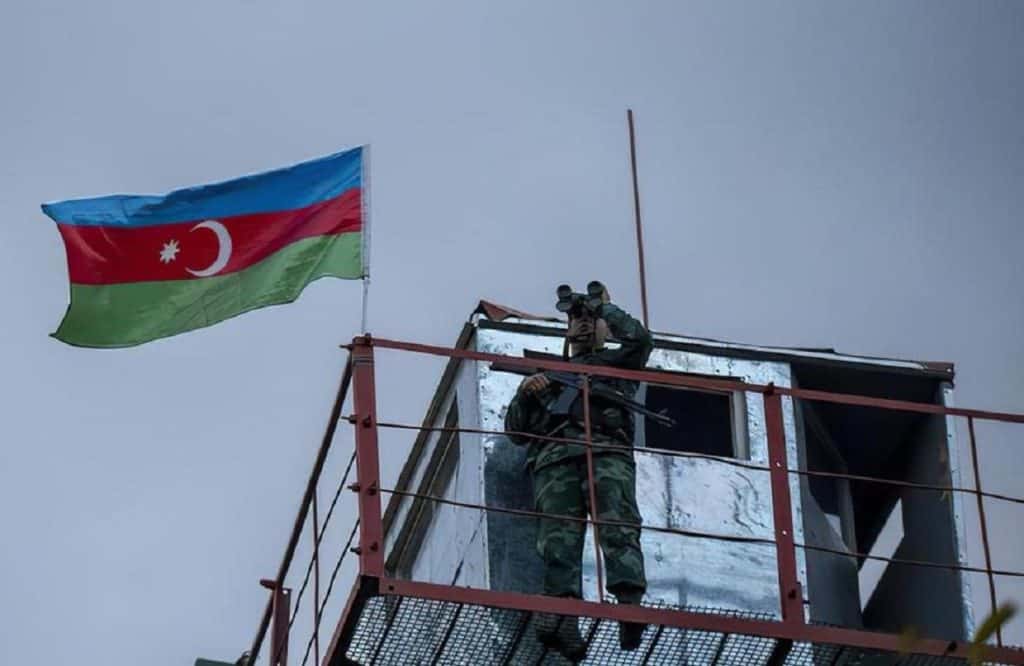By David Davidian
US General George Patton was quoted as declaring, “For over a thousand years Roman conquerors returning from the wars enjoyed the honor of triumph, a tumultuous parade. In the procession came trumpeteers, musicians and strange animals from conquered territories, together with carts laden with treasure and captured armaments. The conquerors rode in a triumphal chariot, the dazed prisoners walking in chains before him. Sometimes his children robed in white stood with him in the chariot or rode the trace horses. A slave stood behind the conqueror holding a golden crown and whispering in his ear a warning: that all glory is fleeting.” After Azerbaijan’s partial victory in the Second Karabakh War, Azerbaijani President Aliev demonstrated nearly all of Patton’s observations in their modern manifestations. What remains is for someone to whisper in Aliev’s ear.

From the chaos created in all partially won conflicts, the Second Karabakh War resulted in unexpected challenges for Azerbaijan. One challenge for Aliev is the uncomfortable fact that Armenians are the indigenous inhabitants of this region and thus their presence needs to eradicated to give historical justification for Baku’s territorial claims. While Armenians lost much of the land they reigned over for nearly thirty years, Nagorno-Karabakh and surrounding regions, Azerbaijan is cementing its partial victory by demolishing any expression of Armenian culture and existence on the land now under its control. Azerbaijan, however, cannot claim a complete victory over Armenians since Azerbaijan doesn’t exercise sovereignty over the Armenians of core Nagorno-Karabakh. Both Azerbaijan and Armenia agreed to accept Russian “peacekeepers” on land over which Azerbaijan claims sovereignty, as the basis for the war’s ceasefire. Most likely, without such “peacekeepers,” no Armenians would exist in what remains of Nagorno-Karabakh. Azerbaijan prefers complete authority over all of what it considers its internationally recognized border while simultaneously deploying several thousand of its soldiers outside of such demarcation on sovereign Armenian territory. What might appear on the surface as Azerbaijani hypocrisy, By engaging in actions it accused Armenians of for a generation, Baku might appear hypocritical, but these actions are actually an expression of Baku’s stalled diplomacy. These diplomatic limitations are further demonstrated by the following:
1 – Azerbaijan refused to show up at the August 23, 2021 Crimean Platform, attended by forty-seven other countries. This event was “a diplomatic initiative of Ukraine and its president … designed to be an international coordination mechanism to restore Russia–Ukraine relations by means of reversing the 2014 annexation of Crimea by the Russian Federation.” This summit was not in the interest of Russia, and Azerbaijan’s presence would have offended Russia. If Azerbaijan’s military and diplomatic capabilities were entirely under its control, it would make sense for Baku to support the restoration of Ukrainian sovereignty over Crimea since it parallels what Azerbaijan demands in the restoration of what it considers is its internationally recognized borders which includes Nagorno-Karabakh. Turkey, Azerbaijan’s big brother, fully supports a Ukrainian Crimea. As a result, Azerbaijan has a policy dilemma.
2 – Earlier in August 2021, Azerbaijan was asked by the Kosovo Minister of Defense for Baku’s official recognition of this NATO-created entity. It is unclear what Pristina was thinking when asking such a request of Baku, considering Kosovo was created under circumstances that paralleled the creation of Nagorno-Karabakh, obviously an intolerable situation for Azerbaijan. Were Baku clear of any lingering military or diplomatic encumbrances regarding Nagorno-Karabakh, it might opt (regardless of its hypocrisy) for Kosovo recognition considering Azerbaijan’s strategic partners Turkey, Pakistan, and Israel also recognize Kosovo.
3 – Azerbaijan is under Turkish pressure to recognize Turkey’s occupation of Northern Cyprus, as a separate state. If Baku were to recognize this entity as a sovereign state, it would surely invite reaction by Greece and the Republic of Cyprus. The latter two are EU members who would call for immediate sanctions against Baku. Both Greece and Cyprus would retaliate and recognize Nagorno-Karabakh. Even though Azerbaijan is supplying gas-starved Europe through Greece via the Azerbaijani-Turkish Trans Adriatic Pipeline (TAP), the economic and diplomatic cost would be too high for Baku to hold EU’s gas supply hostage following EU sanctions after an Azerbaijani recognition of Northern Cyprus. Azerbaijan refused to recognize the Republic of Nagorno-Karabakh and accused Armenians of violating internationally recognized borders. Turkey has done in Northern Cyprus what Azerbaijan “accuses” Armenians of doing. Azerbaijan could recognize Northern Cyprus, but subsequent EU sanctions and loss of gas revenue would tie its hands.
4 – Azerbaijan succumbed to a contingent of two thousand Russian peacekeepers stationed within what Baku considers its internationally recognized land, and worse, land that it claims won from Armenians. This contingent is separating the remaining Armenians in Nagorno-Karabakh from the Azerbaijani Army. However, in an instant, this Russian contingent can take on any enhanced role in Russia’s interest without asking Baku’s permission. Similarly, Turkey would like a base in Azerbaijan, but Baku would be subject to the ire of Moscow. Azerbaijan appears not in full control of its domestic policies.
5 – The recent announcement of significant gas deposits in the Iranian sector of the Caspian, with the capability of supplying twenty percent of Europe’s gas requirements, could incentivize the EU to consider lifting sanctions on Iran. Hydrocarbon extraction and transportation interests monitor such exploration, especially regional suppliers such as Russia and Azerbaijan. Russia and Azerbaijan view Iran as a significant competitor potentially serving European gas requirements. In a possible preemptive move, Azerbaijani soldiers have not only violated Armenia’s frontiers, putting pressure on the Armenian leadership but also engaged in blocking the main south-north transportation roads between Iran and Georgian ports. Such aggressive Azerbaijani actions signal to Iran that it may have to deal with Baku -– not Armenia — before looking north too much longer, even though Iran declared it intends to use Armenia. Additionally, Azerbaijan has begun constructing its south-north route on land it captured in the Second Karabakh War from the Azerbaijani-Iranian border towards the Azerbaijani-Russian border, in an attempt to facilitate Iranian gas exports and exports north. Baku’s attempt to be the go-to dealer between Iran, Russia, while excluding Georgian Black Sea ports, may have repercussions ranging from Israeli operations against Iran to Turkish designs, to the survival of Azerbaijan’s regime in cutting off Georgian-Iranian trade. Some may consider post-war Azerbaijani military pressure as skillful diplomacy, others do not.
6 – Armenia will receive three billion dollars in an EU economic development grant over the next five years. Baku considers this an unfair reward after Azerbaijan “liberated” what it considers its territory. Others consider it a quid pro quo for an engineered defeat of the Armenians of Nagorno-Karabakh. Even with Azerbaijani gas reaching the EU, the EU’s gas supply is diversified with contributions from Algeria, the Netherlands, Norway, and Russia. Azerbaijan’s allocation is not enough to blackmail the EU into not investing in Armenia.
7 – Perhaps the worst shackle for Azerbaijan is the endemic anti-Armenian hatred within Azerbaijani society promulgated as effective state policy. From pre-school to adulthood, an entire generation has been socialized to equate Armenians with the embodiment of evil. Torture and the beheading of Armenians were spread across social media and celebrated by Azerbaijani society throughout the Second Karabakh War. Hatred against Armenians was a method to bolster Azerbaijani nationalism and keep Aliev in power by blaming the ills of Azerbaijan on Armenians. Such techniques were used by Nazi Germany and the transformation of Islamic Turkey into a nationalist Turkey. Even if a titular peace is signed between Armenia and Azerbaijan, Baku will have to undo a generation of anti-Armenian hatred if any agreement is to succeed.
Though Southern Caucasus regional dynamics have changed drastically in the past year, Azerbaijan still finds limited options even with enhanced military agreements with Turkey and having captured land from Armenians. Baku is now even more indebted to two masters; Turkey and Russia.
Author: David Davidian (Lecturer at the American University of Armenia. He has spent over a decade in technical intelligence analysis at major high technology firms. He resides in Yerevan, Armenia).
(The views expressed in this article belong only to the author and do not necessarily reflect the editorial policy or views of World Geostrategic Insights).
This analysis is part of a two-article series. Read also: Armenia’s Limited Diplomatic Options







